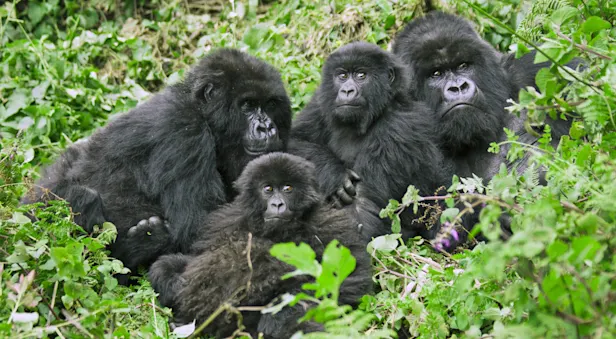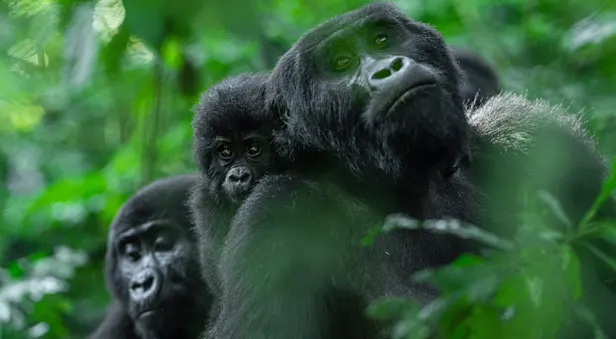Crocodile Facts | Uganda & Rwanda Wildlife Guide
Crocodiles have ancient origins and are believed to have been alive 200 million years ago. It is thought that they look generally the same as they did when dinosaurs roamed the earth. Crocodiles are hardy creatures, having survived mass extinctions, including that of the dinosaurs 65 million years ago. The Nile crocodile is the most common species found in Uganda and Rwanda, and it is the largest freshwater predator in Africa, inhabiting lakes, rivers and marshes. It can reach 20 feet in length and weigh up to 1,650 pounds.
Physical Description
Large aquatic reptiles with a prehistoric look.
Biologically complex with (unlike other reptiles) a cerebral cortex, a four-chambered heart and the functional equivalent of a diaphragm.
External morphology is a sign of their aquatic and predatory lifestyle. They can swim quickly due to their streamlined body, tucking their feet into their sides to reduce water resistance.
Webbed feet help crocodiles walk in muddy, shallow water. Webbed feet also assist them in beginning to swim in deeper waters and making quick turns and abrupt movements.
They possess a palatal flap, which is an unyielding tissue at the back of the mouth that blocks water from entering. The palate traces a path from the nostril to the glottis that circumnavigates the mouth. A crocodile’s nostrils close when it submerges.
The tongue has limited movement due to a special membrane, so crocodilians are unable to stick out their tongues, in contrast with the more flexible-tongued Alligatoridae.
Geographic Range
Crocodiles live throughout the tropics in Africa, Asia, the Americas and Australia.
Habitat & Feeding Habits
Crocodiles gather in watery environments such as rivers, lakes, floodplains, mangroves, estuaries and even saltwater. They eat fish, birds, reptiles and mammals, and occasionally feed on crustaceans and mollusks.
Breeding
Crocodiles reach sexual maturity in about 10 years. Males become sexually mature when they reach 10 feet in length, while females reach sexual maturity at 6.5 to 8 feet long. The largest males are the most dominant during mating season. A male gains a female’s attention by slapping its snout on water, blasting water out of its nostrils, bellowing and making a host of other noises.
Once a female’s attention has been gained, the male and female will brush the underside of their jaws together and make a guttural warbling call. After mating, females will lay their eggs in about two months. Anywhere from 25 to 80 eggs are buried about 20 inches deep in a sandy bank. For about three months, both parents guard the nest and aggressively attack anything that comes near it. Once chirping is heard from the young, the mother digs it up for the offspring to emerge. Then, both parents take eggs in their mouths and help crack them open before taking the offspring in their mouths or leading them to water. The sex of the crocodiles is determined by the temperature during their third week of incubation.
Behavior
Crocodilians ambush their prey, stealthily waiting for fish or land animals such as baboons to draw near, then hastily attacking. They are cold blooded, able to survive extended periods without food due to a slow metabolism. Although they appear sluggish, crocodiles are quick to move and are dominant predators; some species have even been known to attack and kill sharks.
Many species of large crocodiles will ingest stones (called gastroliths) that compress and grate their food, and which aid digestion.
Most crocodiles have salt glands in their tongues and a pore opening on the tongue’s surface. These tongue traits are not present in alligators, and are more similar to marine turtles.
Crocodiles can make distress calls or sounds when challenging one another. They also have ears, which are slits that flap closed when they are submerged in water. They can hear well.
Crocodiles are thought to have a homing instinct. In one case, three wandering saltwater crocodiles in Australia were transported by helicopter about 250 miles, and managed to make their way home in just three weeks, according to data retrieved from their tracking devices.
These predators can quickly move their bodies with a snake-like “belly run,” whipping their tails while splayed limbs propel them forward. In this form, a crocodile can reach speeds of 6 to 7 miles per hour—and even faster when sliding down a muddy riverbank. Crocodiles also move using a “high walk,” in which the body is lifted a distance from the ground.
Crocodiles do not possess sweat glands; they rely on their mouths to dispense heat. They frequently keep their mouths open while they sleep, sometimes even panting like a dog.
Predation
Crocodiles have evolved razor-sharp teeth for grabbing hold and tearing into prey. A crocodile has forceful muscles which lock their jaws tight around a struggling animal, and they can bite down with an enormous force of more than 5,000 pounds per square inch. While they possess the most powerful bite of any creature, the muscles that open their jaws are surprisingly weak.

































